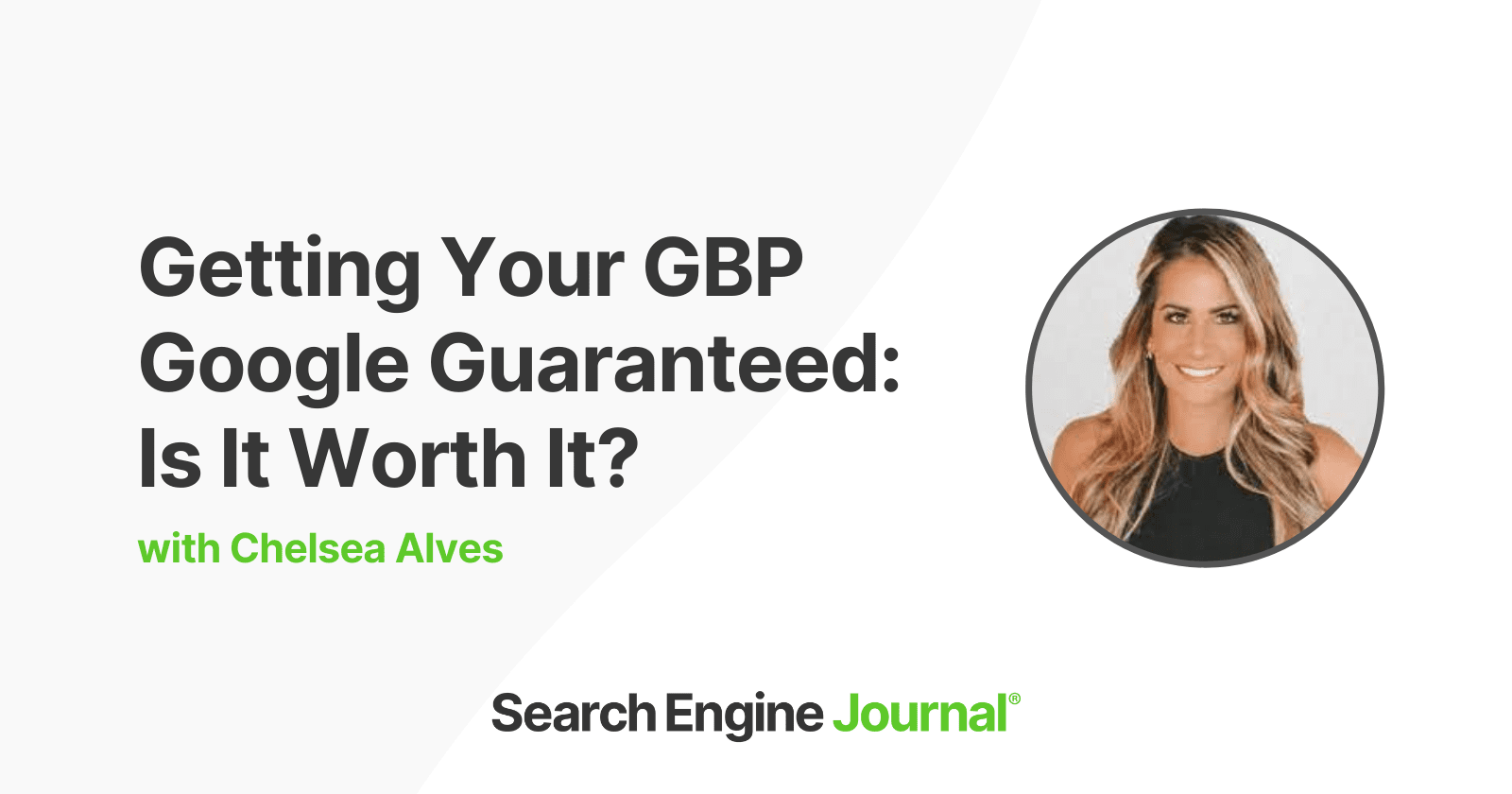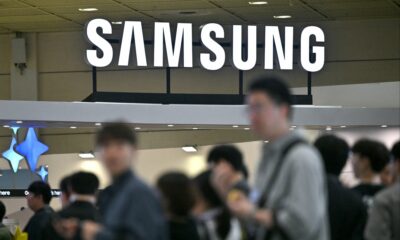SEO
Is Getting Your Google Business Profile “Google Guaranteed” Worth It?

When customers are searching locally for products and services like yours, they often seek validation to ensure they’re making the right choice.
This includes reading online reviews, asking for personal recommendations, or looking for more information about your business on your Google Business Profile.
Google offers a way for businesses in some industries to earn consumers’ trust by becoming a Google Screened or Google Guaranteed provider.
Eligible businesses advertising through Google Local Services Ads can receive the Google Screened or Google Guaranteed designation.
This designation appears when local consumers search for services in their area.
Professional service providers’ ads will appear on Google Search and the Local Services site, and only pay if a customer calls or messages the business directly through the ad.
Learn even more about Google’s screening and verification process here.
Before you apply to become Google Guaranteed, let’s explore the benefits of becoming verified, how it works for consumers, and ultimately, you can decide whether it’s worthwhile for your business.
What Are The Benefits Of Google Guarantee For Brands?
Any way to build trust, promote transparency in your business, and highlight what others think of your business in a positive light is an opportunity to engage a searcher.
Displaying a Google Guarantee badge also benefits businesses in the following ways.
Provides Reassurance For Customers
The Moment For Trust survey found that for 81% of consumers, trust is a deciding factor in purchase decisions.
Yet only 34% of that same audience trusted the brands they use. Google Guarantee helps your business with trust.
It showcases that Google has already screened you as a reputable service provider and trusts you’ll provide quality service to potential customers.
Helps Your Service Ad Stand Out
Not only will consumers see your average star rating on service ads, they’ll also see a prominent green checkmark.
This checkmark enables your business to stand out against competitors who aren’t Google Screened or Guaranteed.
Provides Confirmation Even Via Audio Search And Phone
In the U.S. only, when a customer uses voice search (such as Google Assistant or Google Home) to find their desired service, they will hear confirmation that your business is Google Guaranteed.
Additionally, when customers call your business, they will still be protected by the Google Guarantee.
Shows You Care About Your Business’ Reputation
Building your credibility requires actively identifying new opportunities to do so.
Completing the Google Guarantee qualification process shows your customers that you’re willing to take additional steps to ensure their satisfaction.
Completing the screening process is just another step toward improving your customer’s experience with your business from initial search to purchase.
Google Gives Your Business Its Stamp Of Approval
Google guarantees your business will provide the service to the customer’s satisfaction with a money-back guarantee.
This means Google trusts your business enough to risk its own bottom line.
Drives Qualified Leads
Google Local Service Ads appear for customers in your given service area.
And, as mentioned earlier, you only pay if a customer calls or messages you directly through the ad. This helps make your return on investment worthwhile.
What Is Google Screened?
Google screened is only available to select U.S. verticals.
Google shares that:
“Google Screened professionals have passed extensive background and license checks conducted by Local Services Ads, our trusted partners, or state and/or regulatory bodies.”
The following professional services are eligible for the Google Screened badge:
- Law.
- Financial planning.
- Real estate.
- Providers that work in the child care or preschool industries.
 Image from Google, April 2022
Image from Google, April 2022How Do Businesses Qualify For Local Services Ads?
There isn’t a one-size-fits-all screening process.
Instead, Google states:
“…screening process varies by type of service, the country you’re in, and whether the service provider advertises directly with Google or through one of our partner affiliates.” These screening procedures may include license, insurance, and complete background checks.”
Background checks a business may undergo include:
- Business entity check.
- Business owner background check.
- Service professional background check.
Background checks are conducted by third-party risk management companies Google partners with.
Google also collects and highlights ratings and reviews from customers who hired Local Services providers. If a business repeatedly receives negative reviews, it may decrease in ranking or not appear at all in search.
Learn more about the business-level screening process here.
What Businesses Are Eligible For Google Guaranteed?
In the U.S., the following services categories may be eligible for Google Guaranteed, depending on the state and zip codes:
- Acupuncture.
- Animal rescue services.
- Appliance repair.
- Carpentry.
- Carpet cleaning.
- Child care services.
- Countertop services.
- Dance instruction.
- Electrical.
- Fencing.
- Financial planning.
- First aid training.
- Flooring.
- Foundations.
- Funeral services.
- Garage door.
- General contracting.
- Handyman.
- Home inspection/security/theater services.
- House cleaning.
- HVAC.
- Junk Removal.
- Landscaping.
- Language instruction.
- Law.
- Lawn care.
- Locksmith.
- Massage school.
- Moving.
- Personal training.
- Pest Control.
- Pet grooming/adoption services/boarding/training.
- Plumbing.
- Pool cleaning /contractor.
- Preschool.
- Real estate.
- Roofing.
- Sewage system services.
- Siding.
- Snow removal services.
- Tax services.
- Tree services.
- Tutoring.
- Veterinary services.
- Water damage restoration services.
- Weight loss services.
- Window cleaning/services.
- Yoga.
Learn the requirements by category for US businesses here.
How Does Google Guarantee Work For Consumers?
When a business has a Google Guaranteed designation, consumers have an extra layer of protection when booking services.
In turn, this may prompt consumers to choose your business over another that doesn’t offer any protection.
As Google states,
“Google may, in its absolute and sole discretion, reimburse you up to the cost of the initial service if you are not satisfied with the quality of the service provided, up to a lifetime limit (the maximum aggregate amount you could be reimbursed by Google for all services booked through Local Services in your lifetime).”
The lifetime limits reimbursable to customers vary per country and are up to $2,000 in US dollars and $2,000 in Canadian dollars.
Consumers, however, are only eligible for reimbursement if the service is booked directly through Google Local Services.
Additionally, the claim for reimbursement must be filed within 30 days of service completion.
Is It Worth It To Get Google Guaranteed Or Screened?
Ultimately, whether the Google Guarantee badge is worth it is up to your business.
There are numerous benefits to displaying that Google guarantees your service, including more sales.
It improves confidence in businesses, particularly in the service industry, where consumers are most skeptical.
There is no additional cost to apply for the certification, either.
The bottom line is if your business has the time to complete the signup and verification process, becoming Google Guaranteed or Screened can only improve your brand presence.
Get started with the eligibility and signup process here.
More resources:
Featured Image: Maha Heang 245789/Shutterstock
SEO
Google Declares It The “Gemini Era” As Revenue Grows 15%

Alphabet Inc., Google’s parent company, announced its first quarter 2024 financial results today.
While Google reported double-digit growth in key revenue areas, the focus was on its AI developments, dubbed the “Gemini era” by CEO Sundar Pichai.
The Numbers: 15% Revenue Growth, Operating Margins Expand
Alphabet reported Q1 revenues of $80.5 billion, a 15% increase year-over-year, exceeding Wall Street’s projections.
Net income was $23.7 billion, with diluted earnings per share of $1.89. Operating margins expanded to 32%, up from 25% in the prior year.
Ruth Porat, Alphabet’s President and CFO, stated:
“Our strong financial results reflect revenue strength across the company and ongoing efforts to durably reengineer our cost base.”
Google’s core advertising units, such as Search and YouTube, drove growth. Google advertising revenues hit $61.7 billion for the quarter.
The Cloud division also maintained momentum, with revenues of $9.6 billion, up 28% year-over-year.
Pichai highlighted that YouTube and Cloud are expected to exit 2024 at a combined $100 billion annual revenue run rate.
Generative AI Integration in Search
Google experimented with AI-powered features in Search Labs before recently introducing AI overviews into the main search results page.
Regarding the gradual rollout, Pichai states:
“We are being measured in how we do this, focusing on areas where gen AI can improve the Search experience, while also prioritizing traffic to websites and merchants.”
Pichai reports that Google’s generative AI features have answered over a billion queries already:
“We’ve already served billions of queries with our generative AI features. It’s enabling people to access new information, to ask questions in new ways, and to ask more complex questions.”
Google reports increased Search usage and user satisfaction among those interacting with the new AI overview results.
The company also highlighted its “Circle to Search” feature on Android, which allows users to circle objects on their screen or in videos to get instant AI-powered answers via Google Lens.
Reorganizing For The “Gemini Era”
As part of the AI roadmap, Alphabet is consolidating all teams building AI models under the Google DeepMind umbrella.
Pichai revealed that, through hardware and software improvements, the company has reduced machine costs associated with its generative AI search results by 80% over the past year.
He states:
“Our data centers are some of the most high-performing, secure, reliable and efficient in the world. We’ve developed new AI models and algorithms that are more than one hundred times more efficient than they were 18 months ago.
How Will Google Make Money With AI?
Alphabet sees opportunities to monetize AI through its advertising products, Cloud offerings, and subscription services.
Google is integrating Gemini into ad products like Performance Max. The company’s Cloud division is bringing “the best of Google AI” to enterprise customers worldwide.
Google One, the company’s subscription service, surpassed 100 million paid subscribers in Q1 and introduced a new premium plan featuring advanced generative AI capabilities powered by Gemini models.
Future Outlook
Pichai outlined six key advantages positioning Alphabet to lead the “next wave of AI innovation”:
- Research leadership in AI breakthroughs like the multimodal Gemini model
- Robust AI infrastructure and custom TPU chips
- Integrating generative AI into Search to enhance the user experience
- A global product footprint reaching billions
- Streamlined teams and improved execution velocity
- Multiple revenue streams to monetize AI through advertising and cloud
With upcoming events like Google I/O and Google Marketing Live, the company is expected to share further updates on its AI initiatives and product roadmap.
Featured Image: Sergei Elagin/Shutterstock
SEO
brightonSEO Live Blog

Hello everyone. It’s April again, so I’m back in Brighton for another two days of Being the introvert I am, my idea of fun isn’t hanging around our booth all day explaining we’ve run out of t-shirts (seriously, you need to be fast if you want swag!). So I decided to do something useful and live-blog the event instead.
Follow below for talk takeaways and (very) mildly humorous commentary. sun, sea, and SEO!
SEO
Google Further Postpones Third-Party Cookie Deprecation In Chrome

Google has again delayed its plan to phase out third-party cookies in the Chrome web browser. The latest postponement comes after ongoing challenges in reconciling feedback from industry stakeholders and regulators.
The announcement was made in Google and the UK’s Competition and Markets Authority (CMA) joint quarterly report on the Privacy Sandbox initiative, scheduled for release on April 26.
Chrome’s Third-Party Cookie Phaseout Pushed To 2025
Google states it “will not complete third-party cookie deprecation during the second half of Q4” this year as planned.
Instead, the tech giant aims to begin deprecating third-party cookies in Chrome “starting early next year,” assuming an agreement can be reached with the CMA and the UK’s Information Commissioner’s Office (ICO).
The statement reads:
“We recognize that there are ongoing challenges related to reconciling divergent feedback from the industry, regulators and developers, and will continue to engage closely with the entire ecosystem. It’s also critical that the CMA has sufficient time to review all evidence, including results from industry tests, which the CMA has asked market participants to provide by the end of June.”
Continued Engagement With Regulators
Google reiterated its commitment to “engaging closely with the CMA and ICO” throughout the process and hopes to conclude discussions this year.
This marks the third delay to Google’s plan to deprecate third-party cookies, initially aiming for a Q3 2023 phaseout before pushing it back to late 2024.
The postponements reflect the challenges in transitioning away from cross-site user tracking while balancing privacy and advertiser interests.
Transition Period & Impact
In January, Chrome began restricting third-party cookie access for 1% of users globally. This percentage was expected to gradually increase until 100% of users were covered by Q3 2024.
However, the latest delay gives websites and services more time to migrate away from third-party cookie dependencies through Google’s limited “deprecation trials” program.
The trials offer temporary cookie access extensions until December 27, 2024, for non-advertising use cases that can demonstrate direct user impact and functional breakage.
While easing the transition, the trials have strict eligibility rules. Advertising-related services are ineligible, and origins matching known ad-related domains are rejected.
Google states the program aims to address functional issues rather than relieve general data collection inconveniences.
Publisher & Advertiser Implications
The repeated delays highlight the potential disruption for digital publishers and advertisers relying on third-party cookie tracking.
Industry groups have raised concerns that restricting cross-site tracking could push websites toward more opaque privacy-invasive practices.
However, privacy advocates view the phaseout as crucial in preventing covert user profiling across the web.
With the latest postponement, all parties have more time to prepare for the eventual loss of third-party cookies and adopt Google’s proposed Privacy Sandbox APIs as replacements.
Featured Image: Novikov Aleksey/Shutterstock
-

 PPC7 days ago
PPC7 days ago19 Best SEO Tools in 2024 (For Every Use Case)
-
SEARCHENGINES6 days ago
Daily Search Forum Recap: April 19, 2024
-
SEARCHENGINES7 days ago
Daily Search Forum Recap: April 18, 2024
-

 WORDPRESS6 days ago
WORDPRESS6 days agoHow to Make $5000 of Passive Income Every Month in WordPress
-

 SEO7 days ago
SEO7 days ago25 WordPress Alternatives Best For SEO
-

 WORDPRESS5 days ago
WORDPRESS5 days ago13 Best HubSpot Alternatives for 2024 (Free + Paid)
-

 WORDPRESS6 days ago
WORDPRESS6 days ago7 Best WooCommerce Points and Rewards Plugins (Free & Paid)
-

 MARKETING6 days ago
MARKETING6 days agoBattling for Attention in the 2024 Election Year Media Frenzy
















You must be logged in to post a comment Login